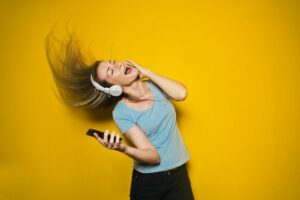Rehearsal concerts, passion for hunting or motor sport, regular listening to music at maximum volume, use of noisy tools when doing crafts, riding a motorbike: in everyday life, many types of noises contribute to prematurely damage the hearing. The damage varies depending on the intensity of the noise, its duration, and the frequency of exposure. The damage can be minor such as occasional discomfort or tinnitus but also more important such as irritability, depression (especially in a professional setting), hyperacusis, or hearing loss. Older people should take extra care.

To protect your hearing on a daily basis, there are a few simple rules to follow:
- Do not listen to music at too high a volume and therefore limit the sound output power, whether with headphones or earphones;
- Take 10-minute breaks every 45 minutes when listening to music through headphones or earphones;
- Also take regular breaks when practicing a noisy activity;
- At concerts or in a nightclub, keep away from the speakers.
To go further in protecting your hearing, it is recommended to use ear muffs or earplugs when engaging in noisy activities for an extended period of time. These tools reduce noise and limit exposure. In foam, rubber or silicone, disposable or not, earplugs come in several forms. It is even possible to have them made to measure, according to the impression of the ear canal, for optimal sound insulation. But first you should look at advice on managing hearing health.
Have good ear hygiene
Earwax plays a protective role for the ear as it helps protect the eardrum and prevent dust and bacteria from entering the ear canal. The amount of earwax is regularly renewed in the ear and the excess usually flows naturally to the outer pinna.
If it is important to regularly remove the unsightly discharge of cerumen nested in the pinna of the ear, it is still recommended to limit the use of the cotton swab to 1 to 2 times per week. This prevents overproduction of earwax and the formation of plugs generated by pushing the earwax inside the ear canal. Earwax plugs can indeed damage hearing.
Water, a scourge for hearing capital
Water and ears don’t usually mix. Combined with salt or chlorine, it can be responsible for infections in the most sensitive subjects and have an impact on hearing. In order to preserve your hearing, it is advisable to systematically dry the ears after swimming in the pool or at sea, or after a shower. If you are prone to infections, earplugs dedicated to swimming, which let sound through but remain waterproof, are essential to protect the ear canal.
The auditory capital is a precious commodity that it is important to preserve as much as possible. For seniors, it is important to regularly take stock of their hearing and take action if necessary. Many organizations specializing in the sale of hearing aids offer free hearing assessments. In addition, it is always possible to obtain information and obtain advice during a visit to the general practitioner.
Solutions against hearing loss
If your workup indicates hearing loss, see an ENT doctor to confirm it and find the cause. In some cases you will need to consider purchasing a hearing aid suited to your needs, which will be performed by a hearing care professional.





